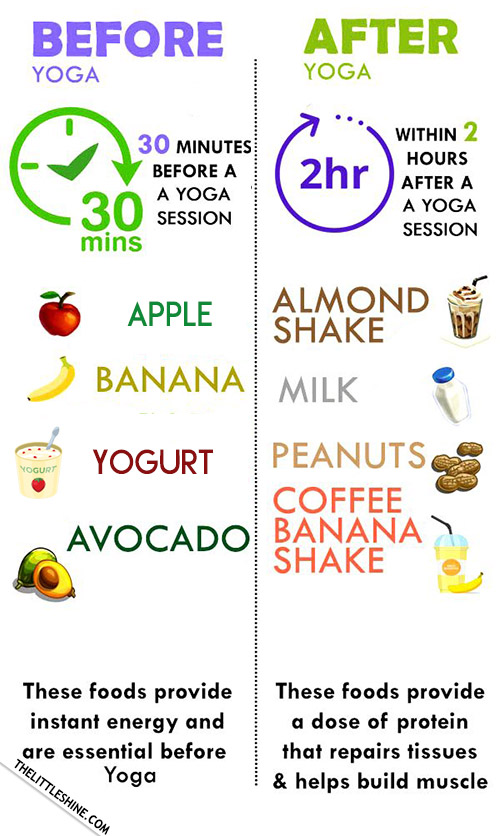Ideally, yoga should be done on an empty stomach, early in the morning. However, considering the hectic lifestyle that we lead today, it may not be possible to practice yoga in the morning. So, whenever you can squeeze time out for yoga, it is important for you to eat right- both before and after yoga. Wondering about the right kind of meals preceding your yoga classes? Keep reading:

WHAT TO EAT BEFORE YOGA?
It is important to choose snacks that can be digested easily and will enable you to stay light while doing yoga. Check out the following tips that you can keep in mind:
- Go for simple carbohydrates with a touch of fibre or protein.
- Avoid consuming anything high on fat. Keep acidic and spicy food at bay.
- Eat food items low on glycemic index.
- Choose snacks that give you energy and are easy for your digestive system.
Ideally, you should eat around 1 to 2 hours before your yoga session. It is always better to eat or drink anything for that matter at least 30 minutes before yoga.
Pre-Yoga Meal Ideas
Peanut Butter And fruits: Banana or apple, topped with nut butter, would make an excellent pre-yoga snack. Bananas are inexpensive, readily available throughout the year and are full of nutrients. While banana gives you energy, the sugar content in the butter helps you sustain throughout your yoga session. Instead of peanut butter, you can even go for cashew butter or almond butter.
Avocado-Toast: Avocado and toast (whole grain or multigrain toast) is the right combination of good fat and carbs. Avocado, a fruit loaded with minerals like magnesium and potassium, helps your muscles to function properly. At the same time it keeps you satiated for a long time.
Nuts – A handful of almonds or any of your favorite nuts will provide a good mix of protein and fat, with a tiny bit of carbohydrate to help power you through your time on the mat.
What Not to Eat Before Yoga –
Do not eat greasy or oily food like a burger or fries. While some people swear by drinking a pre-yoga smoothie, the excess liquid around in their stomach can make you feel uncomfortable.
What To Eat After Yoga?
Eating is important but drinking water is perhaps more important. So, after practising yoga, drink a lot of water to keep your body hydrated. After drinking some water, here are some of the meals that you can opt for:
- Vegetable Soup: For a wholesome meal that will help replenish your energy levels after a rigorous yoga session, churn up a homemade vegetable soup. Soup made with carrots, beans, spinach, cabbages and celery could be an excellent option. You can even add a few chunks of boiled chicken for added taste. Use shredded ginger, black pepper powder, chopped coriander leaves or even a dash of lemon juice for a delicious flavour.
- Bread And Egg Whites: For the right balance of protein and carbs after your yoga classes, enjoy a fulfilling meal of bread made with whole grains and egg whites. While egg whites are rich in protein, whole grain bread gives you the complex carbs that your body requires.
- Vegetable Salad: Wish to add colours and nutrients to your plate at the same time? Eat a generous serving of salad made with freshly boiled leafy greens and organic vegetables. You may even add some raw vegetables, based on your preference. Carrots, capsicum, peas and broccoli with some boiled chickpeas, black beans or sprouts would make an excellent salad option. Use cilantro or a pinch of black pepper for flavour.
- Milk And Oatmeal: A bowl of oatmeal with milk and some berries added is a great meal option post yoga. You can go for regular milk or even choose low-fat non-dairy milk like almond milk. You may even add a few chunks of banana to this hearty bowl. This meal is rich in proteins.
- Chicken, Avocado And Sweet Potatoes: Eating an assortment of avocado, sweet potatoes and chicken breast baked to perfecting is a nutritious way of combating the tiredness post yoga. It’s delicious and healthy at the same time.
Tips On Eating After Yoga
- As you know, drinking water after yoga is very important to avoid dehydration. For variation, you can drink coconut water or fresh fruit juice also. However, make sure you don’t have added sugar in fruit juice. Avoid canned or processed juice items.
- Avoid deep-fried items or food rich in oil and spices.
- Try eating homemade protein-rich smoothies, fruit salad and a handful of nuts